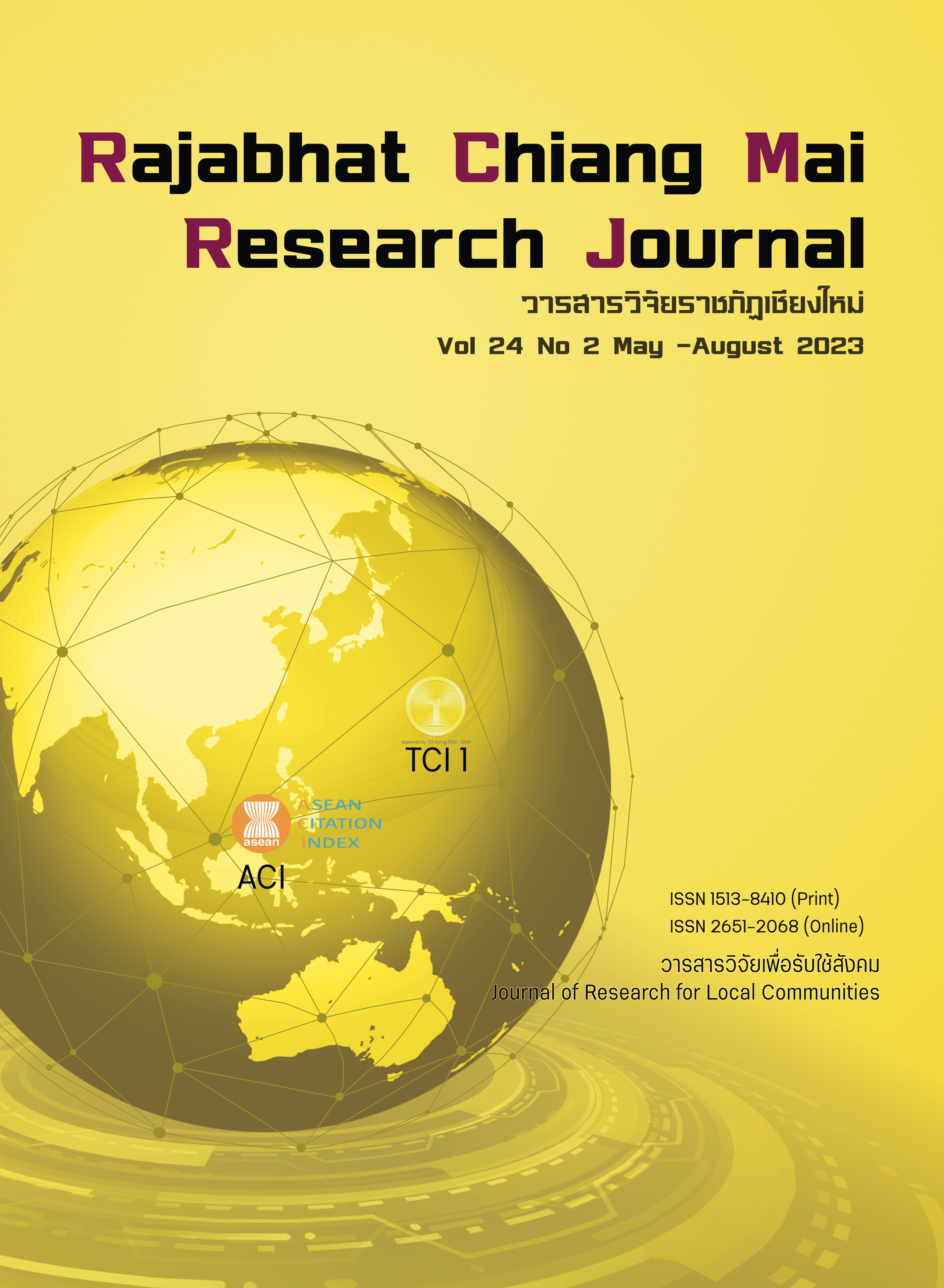A Development Model of School Administration Towards the Next Normal
DOI:
https://doi.org/10.57260/rcmrj.2023.264458Keywords:
Model, School administration, The next normalAbstract
The objectives of this research were: 1) to investigate the current state and problems of school administration in the new normal to prepare the school for the next normal; 2) to analyze success factors and conditions of school administration towards the next normal; 3) to develop a model for school administration towards the next normal, and 4) to propose policy proposals and practical guidelines for school administration towards the next normal. The research was divided into four phases, as follows: 1) investigate the current state and problems in the new normal by using an in-depth interview with 29 administrators; 2) analyze the success factors and conditions by participating in the workshop of 11 informants; 3) develop a model by constructing, verifying, and evaluating it by attending connoisseurship; and 4) propose policy proposals and practical guidelines by conducting brainstorming discussions with 15 experts and a research team. The research results were as follows: 1) the current state and problems in the new normal have seven components: 1) Planning (P), 2) Organizing (O), 3) Staffing (S), 4) Directing (D), 5) Coordinating (C), 6) Reporting (R), and 7) Budgeting (B); 2) the success factors and conditions were administrators, educators, and school boards must work together to ensure the overall academic progress of students, technology, and communications were playing an important role in helping people adapt to the next normal; 3) a model consisted of a principle, objectives, operational approaches, an evaluation, and conditions for achievement; and 4) policy proposal and practical guidelines were the government should implement an entirely new policy to establish strategies for school administration towards the next normal and the Office of the Basic Education Commission (OBEC) and directors of the Educational Service Area should lead the school administrators and affiliate agencies to apply strategies into practices for school administration towards the next normal.
Downloads
References
Bozkurt, A., & Sharma, R. C. (2020). Education in normal, new normal, and next normal: Observations from the past, insights from the present, and projections for the future. Asian Journal of Distance Education, 15(2), 1-10. Retrieved from https://zenodo.org/record/4362664#.YUfLyrhLjDc
Chirakitnimit, N., & Laoakka, S. (2020). Current Conditions and Problems of Digital Cultural Heritage Archive in Thailand. Rajabhat Chiang Mai Research Journal, 21(3), 144–154. https://doi.org/10.14456/rcmrj.2020.240385 (In Thai)
CTOUCH Europe BV. (2021). 6 advantages of digital education. Retrieved from https://ctouch.eu/newshub/6-advantages-of-digital-education
Information and Communications Technology Council (ICTC) - Conseil des technologies de l’ information et des communications (CTIC). (2021). Shaping the Next Normal. Retrieved from https://medium.com/informationandcommunicationstechnologycouncil/ shaping-the-next-normal-27e477e14c04
Lead for Literacy. (2022). 4 Reasons Literacy Leadership Matters. Retrieved from https://leadforliteracy.org/briefs/4-reasons-literacy-leadership-matters
Linde, S. (2017). How Teachers & Administrators Work Together. Retrieved from https://study.com/academy/lesson/how-teachers-administrators-work-together.html.
Mathuros, S. (2021). Management Education Online in the NEW NORMAL COVID-19. Rajapark Journal (Humanities and Social Sciences), 15(10), 33-42. https://so05.tci-thaijo.org/index.php/RJPJ/article/view/250336/170299 (In Thai)
Musikanon, C. (2022). Educational Management in the Next Normal. Western University Research Journal of Humanities and Social Science, 8(2), 280-293. https://so04.tci-thaijo.org/index.php/WTURJ/article/download/258745/176449/980933 (In Thai)
Organization for Economic Co-operation and Development (OECD). (2022). Review Education Policies - OECD: Learning environment. Retrieved from https://gpseducation.oecd.org/revieweducationpolicies/#!node=41710&filter=all
Overstreet, M. (2022). Literacy Lens: Literacy Leadership for Positive Change. Retrieved from https://educationnorthwest.org/insights/literacy-lens-literacy-leadership-positive-change
Richmond, G. (2023). Choice, Flexibility, Accountability Drive School Improvement. Retrieved from https://www.educationnext.org/choice-flexibility-accountability-drive-school-improvement-what-explains-charter-success/
Sneader, K., & Singhal, S. (2020). Beyond coronavirus: The path to the next normal. Retrieved from https://www.mckinsey.com/industries/healthcare-systems-and-services/our-insights/beyond-coronavirus-the-path-to-the-next-normal
Supising, J., Puthaprasert, C., Thammachai, P., Kosanpipat, S., Phuvipadawat, S., & Muntabutara, S. (2022). The Current Conditions and Problems of School Administration of the New Normal to Prepare the Schools towards the Next Normal. The 21st. National Conference “Creating Research for Life Quality Development and Society in the Next Normal” At Western University, Watcharapol Campus, 19 November 2022, pp. 131-142. (In Thai)
Supising. J. (2022). School Administration towards the Next Normal. Chiang Mai: S. Karnpim. (In Thai)
Thailand Development Research Institute (TDRI). (2022). A practical guide to reopening schools. Retrieved from https://tdri.or.th/en/2022/02/a-practical-guide-to-reopening-schools (In Thai)
Thepthewin, N. (2018). The Development Strategy Plan by Participatory Lifelong Education Management with Public District of the Office of Non-formal and Informal Education. Rajabhat Chiang Mai Research Journal, 18(1), 103–112. https://doi.org/10.14456/rcmrj.2017.220985 (In Thai)
World Economic Forum. (2020). 4 ways COVID-19 could change how we educate future generations. Retrieved from https://www.weforum.org/agenda/2020/03/4-ways-covid-19-education future-generations
Downloads
Published
How to Cite
Issue
Section
License
Copyright (c) 2023 Rajabhat Chiang Mai Research Journal

This work is licensed under a Creative Commons Attribution-NonCommercial-NoDerivatives 4.0 International License.
1. Articles, information, content, images, etc published in the “Community and Social Development Journal” are copyrighted by the Community and Social Development Journal, Chiang Mai Rajabhat University. In order to properly distribute the articles through print and electronic media, the authors still hold the copyright for the published articles under the Creative Commons Attribution (CC BY) license, which allows the re-distribution of the articles in other sources. References must be made to the articles in the journal. The authors are responsible for requesting permission to reproduce copyrighted content from other sources.
2. The content of the articles appearing in the journal is the direct responsibility of the article authors. The editorial board of the journal does not necessarily agree with or share any responsibility.














